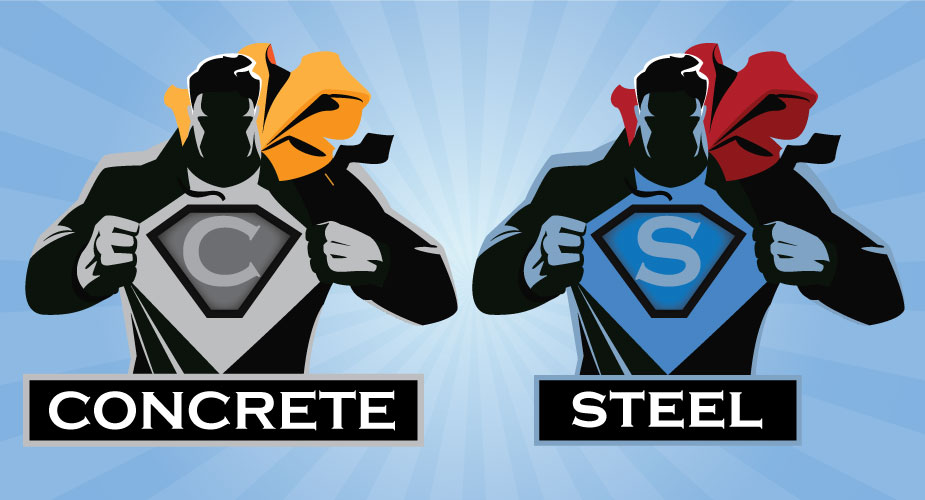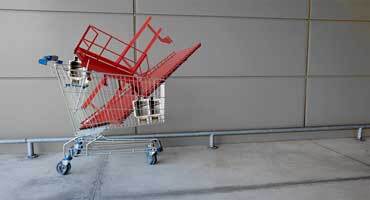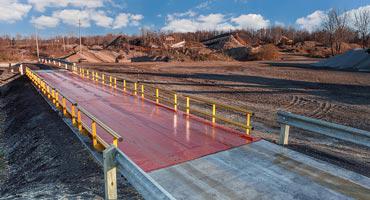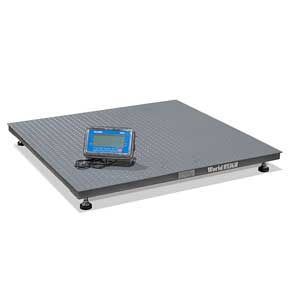The B-TEK Learning Center
Resources to help you scale your business with B-TEK.

Learn what you need to look for when choosing between a concrete deck truck scale and a steel deck truck scale, depending on your business's needs.
Comparing Concrete Deck vs. Steel Deck Semi-Truck Scales
Are you a logistics company owner-operator trying to decide between buying a steel deck or a concrete deck semi-truck scale? Is the process overwhelming for you? In addition to different warranties, calibration costs, and whether or not you need an NTEP approval, there are many things to consider before you make your purchase.
Most truck scale systems have features they share in common. They will have ramps, that lead up to a platform or weighbridge that rests on a grouping of, load cells. These load cells are connected to a junction box that adds up the weight and displays the output on an LCD screen or remote display. Sometimes the weight data even transmits via Bluetooth in real-time to mobile devices or is streamed inside the scale house.
Truck scales can come in a variety of configurations, but one of the biggest decisions is whether the weighbridge platform above the load cells is a concrete deck or steel deck. Your business's needs may draw you towards one type of deck over the other. For example, a system intended for dump trucks working in a quarry may not be ideal for quickly checking the vehicle weight of a tractor-trailer operating over its load capacity.
This article will tackle the differences between steel deck and concrete deck scales. We will look at the pros and cons of both types of vehicle scales while also helping you decide which one better suits your needs.
Characteristics of Steel Deck Truck Scale Systems
Steel deck truck scales are built with structural steel beams with various thicknesses of tread plate welded on top of the beams. The beams support the tread plate, typically positioned under the anticipated tire paths for most trucks.
Some manufacturers use a channel or formed channel design in place of actual support I-beams. While this method has been around for quite some time, it is less durable and not recommended if your scale will see a lot of truck traffic and you want the longest possible life out of it.
Tread plate thickness is also significant for higher-traffic applications. The industry standard is typically between 1/4" to 3/8" in thickness. The more traffic the scale sees, the closer to 3/8" you should be. The highest traffic applications even utilize deck plate thickness of around 1/2" for standard trucks. Additionally, scales that support off-road vehicles are often made with a 1/2" thick tread plate and even sometimes reach a 3/4" tread plate. The more demanding the application, the thicker the deck plate needs to be.
INSTALLATION OF A STEEL DECK TRUCK SCALE
A steel deck truck scale typically requires less labor and less time for installation. Steel deck truck scales can be installed and fully operational within a day at your site. This reduced downtime has obvious operational impacts on your business. A steel deck scale is also more mobile. It typically can be moved by a standard crane, and its components tend to be sturdy enough to endure being lifted, transported, and reinstalled.
FUTURE SERVICE OF A STEEL DECK TRUCK SCALE
Future service is often one of the most overlooked parts of a steel deck truck scale. While steel could need repaired more often than a concrete deck due to wear and tear and exposure to rain, it is significantly easier and cheaper to make repairs. In addition, cutting out worn or rusted parts and welding new steel back in is much less painful than chopping out and repouring concrete sections.
Characteristics of Concrete Deck Truck Scale Systems
A concrete deck truck scale is almost like a giant bathtub. The scale arrives with the framing intact. The middle is filled with concrete which becomes the actual scale deck. The middle area typically includes some wire mesh or smaller I-beams to reinforce the concrete and give it a longer life.
Most concrete deck truck scales are between 6" and 10" in concrete thickness. Any smaller thickness is probably a pre-cast weighbridge poured at the manufacturer's location before shipping. While some people prefer these models because they don't have to wait on concrete cure time, pre-cast scales are not as heavy-duty, are typically engineered for lighter traffic applications, and have a much shorter life span.
INSTALLATION OF A CONCRETE DECK TRUCK SCALE
Concrete typically needs four weeks for a FULL cure. Even quick-setting concrete will require over a week to fully cure. The cure time of a concrete deck truck scale is the most significant deterrent for most people. We live in an immediate world, and most people want to use their new equipment right when it's installed.
Choosing the Right Weighing Scale System
It sounds like we are recommending a steel deck truck scale over a concrete deck truck scale. We aren't, but the number of steel decks in the market surpasses concrete decks by at least 5 to 1. Here are some specific instances where you should seriously consider a concrete deck truck scale:
- Truck drivers will be getting out of their trucks and walking on the scale - Concrete deck truck scales are much less slippery than painted steel deck truck scales and can be safer for your truckers.
- The product driven over the scale is highly corrosive - Fertilizers, chemicals, and many liquid gases can prematurely corrode a painted surface and even the steel underneath.
- The scale will never be moved. While neither type of deck is designed to be a portable truck scale, moving concrete scales is difficult due to the overall weight. The crane and trucking costs are typically more than double that of moving a steel deck truck scale. If your operation needs a setup that can relocate from time to time, you might consider a portable weighing solution like our low-profile portable truck scale. Or if your needs don't require a precise legal-for-trade truck weight, you can consider an axle scale, also known as wheel weighers, or an onboard load scale.
- The scale will be in a coastal environment or an area where roads are salted - Much like the corrosive products mentioned earlier, salt can quickly eat away at steel. This is true for saltwater in the air and salt physically coming into contact with the scale. If you plan to salt your scale in the winter or if your trucks are carrying salt, you should consider a concrete deck truck scale.
We hope this helps you decide which type of scale is right for you. Balancing installation costs, durability, and time investment, all while delivering the accurate weights you need. If you would like some industry expertise to help you find the right scale for you, don't hesitate to contact B-TEK for an unbiased opinion.










